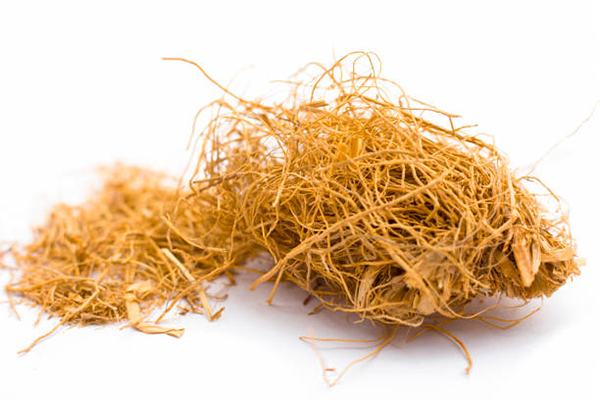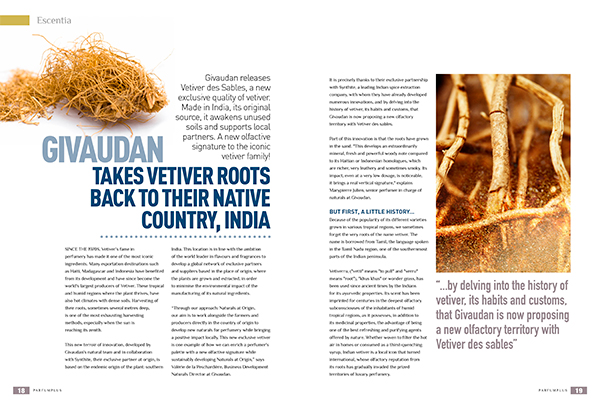Read this post in
 Arabic
Arabic

Givaudan Takes Vetiver Roots Back To Their Native Country, India
Givaudan releases Vetiver des Sables, a new exclusive quality of vetiver. Made in India, its original source, it awakens unused soils and supports local partners. A new olfactive signature to the iconic vetiver family!
Since the 1970s, Vetiver’s fame in perfumery has made it one of the most iconic ingredients. Many exportation destinations such as Haiti, Madagascar and Indonesia have benefited from its development and have since become the world's largest producers of Vetiver. These tropical and humid regions where the plant thrives, have also hot climates with dense soils. Harvesting of their roots, sometimes several metres deep, is one of the most exhausting harvesting methods, especially when the sun is reaching its zenith.
This new terroir of innovation, developed by Givaudan's natural team and in collaboration with Synthite, their exclusive partner at origin, is based on the endemic origin of the plant: southern India. This location is in line with the ambition of the world leader in flavours and fragrances to develop a global network of exclusive partners and suppliers based in the place of origin, where the plants are grown and extracted, in order to minimise the environmental impact of the manufacturing of its natural ingredients.
“Through our approach: Naturals at Origin, our aim is to work alongside the farmers and producers directly in the country of origin to develop new naturals for perfumery while bringing a positive impact locally. This new exclusive vetiver is one example of how we can enrich a perfumer's palette with a new olfactive signature while sustainably developing Naturals at Origin,” says Valérie de la Peschardière, Business Development Naturals Director at Givaudan.
It is precisely thanks to their exclusive partnership with Synthite, a leading Indian spice extraction company, with whom they have already developed numerous innovations, and by delving into the history of vetiver, its habits and customs, that Givaudan is now proposing a new olfactory territory with Vetiver des sables.
Part of this innovation is that the roots have grown in the sand. "This develops an extraordinarily mineral, fresh and powerful woody note compared to its Haitian or Indonesian homologues, which are richer, very leathery and sometimes smoky. Its impact, even at a very low dosage, is noticeable, it brings a real vertical signature," explains Marypierre Julien, senior perfumer in charge of naturals at Givaudan.
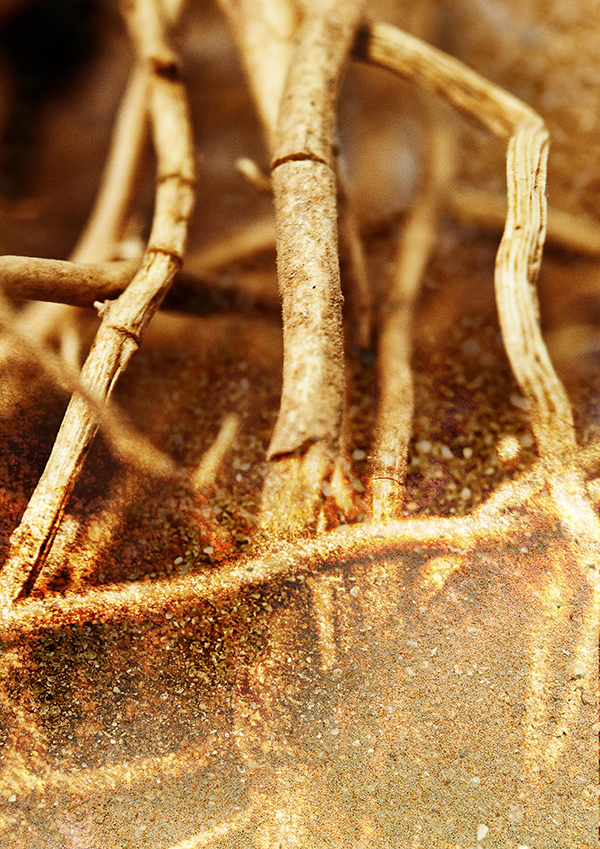
But first, a little history...
Because of the popularity of its different varieties grown in various tropical regions, we sometimes forget the very roots of the name vetiver. The name is borrowed from Tamil, the language spoken in the Tamil Nadu region, one of the southernmost parts of the Indian peninsula.
Vetiverru, ("vetti" means "to pull" and "verru" means "root"), "khus khus" or wonder grass, has been used since ancient times by the Indians for its ayurvedic properties. Its scent has been imprinted for centuries in the deepest olfactory subconsciouses of the inhabitants of humid tropical regions, as it possesses, in addition to its medicinal properties, the advantage of being one of the best refreshing and purifying agents offered by nature. Whether woven to filter the hot air in homes or consumed as a thirst-quenching syrup, Indian vetiver is a local icon that turned international, whose olfactory reputation from its roots has gradually invaded the prized territories of luxury perfumery.
Continuous responsible sourcing & agronomic progresses
The roots of this beautiful ingredient grow in the sand of this typical Indian coast, in soils that were abandoned, and not usable for any food purposes. Indeed, Indian agricultural lands are precious and are used primarily for food cultivation. “In addition, vetiver’s moisture retention property makes it a natural choice for soil conservation and replenishment of groundwater. It is ideal for dry land cultivation as the water is anchored in a virtuous circle of recycling, amplified by the natural presence of clay in the soil,” says Fabien Durand, director of Naturals innovation at Givaudan.
Moreover, by planting vetiver in the sand, the roots are easier to harvest as compared to other regions where the earth can be very dense. And if all this was not sufficient enough, vetiver can help remedy severe cases of soil erosion thanks to its long, tough roots that help create natural terraces without spreading outwards.
Givaudan Naturals at Origin approach
Throughout the years, Givaudan has built a unique network to take care of Naturals, the most precious resources for perfumery, to buy and develop innovative Naturals in a responsible way under a strategic approach: Naturals at Origin.
The Vetiver des Sables is a beautiful expression of a sustainable, responsible and inspired innovation, made at Origin!
Here Are A Few Perfumes That Share Vetiver As A Key Ingredient
Vétiver
Eau de Toilette By Carven
Notes: Bergamot, Lavender, Citrus, Sandalwood, Vetiver, Cedar, Geranium,
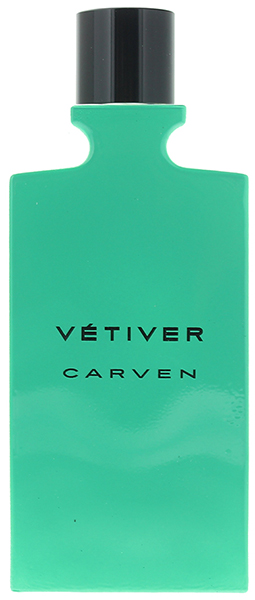
Grey Vetiver
Eau de Parfum By Tom Ford
Notes: Basil, Grapefruit, Lemon & Bergamot, Nutmeg, Orris Root & Pimento, Vetiver,
Woody Notes, Oakmoss & Amber

Sycomore
Eau de Parfum By Chanel
Notes: Vetiver, Cypress, Juniper,
Pink Pepper, Smoke, Burning woods
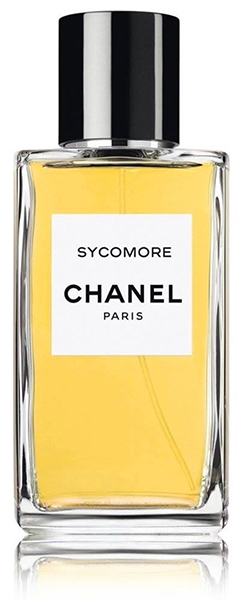
Hermèssence Vétiver Tonka
Eau de Toilette By Hermès
notes: Caramel, Praline, Blonde
Tobacco Notes, Tonka Bean, Vetiver

Read this post in
 Arabic
Arabic


